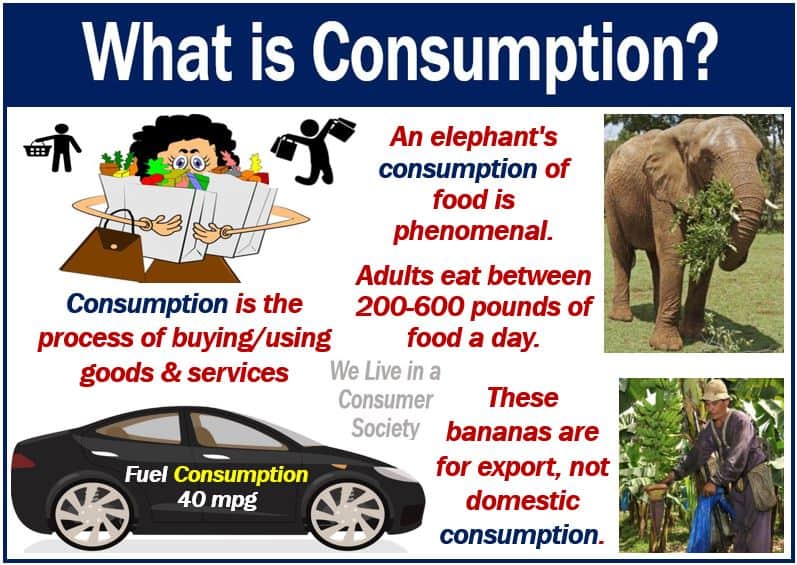Consumption means the amount of something that people and other entities use. It is also the process of using something, often so that there is less of it available afterward. The term may refer to the usage of products and services in an economy, or how much of those goods and services people use.
When we say that something is fit for human consumption, it means that people can eat or drink it.
We sometimes use the term when referring to information or entertainment that only certain people should see. For example, if I say “That film is not for public consumption,” it means that the general public should not watch it.
In the past, the term, along with King’s evil or scrofula, used to mean ‘tuberculosis.’ In the 1930s, for example, if somebody said, “He has consumption,” it meant that they had tuberculosis.
Traditionally, consumption was a term tied closely to survival, referring to the basic human act of consuming food and water.”

Consumption – foundation of economics
Consumption is the process of buying or using goods and services. In other words, doing what consumers in an economy do – consume.
It is the basic foundation for economics, as well as a country’s broader economy. We base our whole economic system of reward and progress on purchasing (consuming) and producing more and more goods and services.
In an economy, consumers decide what to consume based on the availability and price of things. We also base what we consume on our own needs and wants.
According to MyAccountingCourse:
“There are many industries, such as advertising and marketing that are solely devoted to figuring out how to get more consumers to consume their product.”
“Economics sees consumption as the bedrock of our economic activity, and is necessary for our lives.”
-
Compound phrases in economics
In Economics, there are many compound phrases containing the word “consumption,” including Energy consumption, consumption habits, consumption pattern, per capita consumption, mass consumption, consumption tax, and consumer consumption behavior.
A compound phrase is a term that consists of two or more words.
A government spending multiplier
The consumption function, in economics, is the relationship between consumption and disposable income. British economist John Maynard Keynes introduced the concept into macroeconomics in 1936. He used it to develop the notion of a government spending multiplier.
Macroeconomics is a branch of economics that focuses on large-scale economic factors. In other words, factors that exist throughout the whole economy.
Interest rates and unemployment, for example, are large-scale economic factors. Inflation and national output are also macroeconomic factors.
Microeconomics, the opposite of macroeconomics, is the study of the economic behavior of the economy’s individual units.
Contemporary economic discussions often incorporate the concept of sustainable consumption, which aims to balance economic activity with environmental stewardship. This trend started in the late 20th century as awareness of environmental degradation and resource depletion became more pronounced globally.
“Consumption” is a derivative of “consume”
The term “consumption” is a derivative of the English root word “consume.” Let’s look at the different parts of speech that are derivatives of “consume”:
-
Consume (Verb)
To use up resources or time.
For example: “The project will consume the majority of our budget for the year.”
-
Consumer (Noun)
A person who purchases goods and services for personal use.
For example: “The supermarket’s new policy was well-received by consumers.”
-
Consumption (Noun)
The using up of a resource or the amount used up.
For example: “The report highlighted an increase in the country’s energy consumption.”
-
Consumptive (Noun)
A person who has tuberculosis.
For example: “In the 19th century, consumptives were often sent to sanatoriums for treatment.”
-
Consumerism (Noun)
The protection or promotion of the interests of consumers; the preoccupation with and an inclination toward the buying of consumer goods.
For example: “Consumerism seems to peak during the holiday shopping season.”
-
Consumable (Adjective)
Intended to be used up and then replaced.
For example: “Her grocery list mostly consisted of consumable items like bread and milk.”
-
Consumptive (Adjective)
Related to or suffering from tuberculosis (historically referred to as consumption).
For example: “The novel’s hero was a consumptive character, adding to the tragic storyline.”
-
Consuming (Adjective)
Engrossing or absorbing all of one’s attention or energy.
For example: “She had a consuming passion for the arts.”
-
Unconsummated (Adjective)
Not completed, typically referring to a marriage or relationship that has not been physically consummated.
For example: “Their relationship remained unconsummated, as they were waiting for the right moment.”
-
Consummately (Adverb)
Completely or to a high degree of skill.
For example: “He played the piano consummately, impressing everyone in the room.”
Video – What is Consumption?
This interesting video, from our sister channel in YouTube – Marketing Business Network, explains what ‘Consumption’ is using simple and easy-to-understand language and examples.
